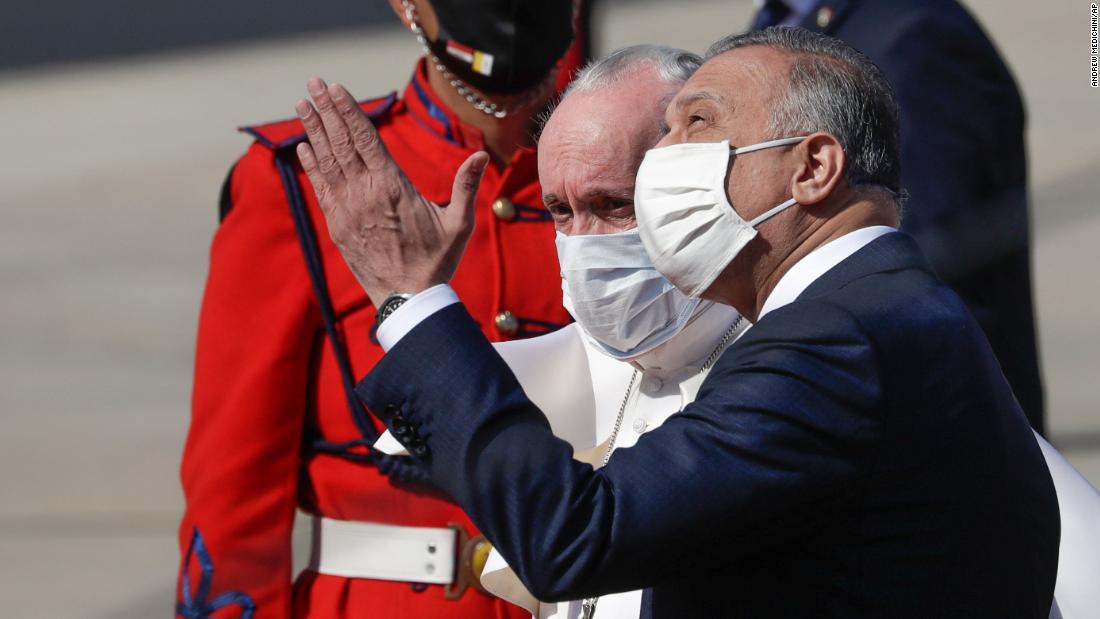
The trip, which marks the very first papal visit to Iraq, also includes meetings with the country’s top political and religious officials.
“I’ve wanted to meet those people who have suffered so much for a while,” Francis said Wednesday. ‘The people of Iraq are waiting for us. They were waiting for Saint Pope John Paul II, who was not allowed to go, ” he added, referring to a planned trip in 2000 that was canceled after a failure in talks between the Vatican and then-President Saddam Hussein.
“The people cannot be abandoned a second time. Let’s pray that this journey can be done properly.”
Iraqi officials have hailed the visit as a significant moment for the country, while privately admitting that the timing of the trip has proved challenging for authorities.
Iraq has imposed a total curfew for the entire four-day papal visit in an effort to minimize health and security risks.
One of the most important parts of the Pope’s journey is a Saturday visit to Grand Ayatollah Ali al-Sistani, a well-respected Shia cleric. Sistani will receive the Pope at his residence in the holy city of Najaf, south of Baghdad.
The papal meeting with 90-year-old Sistani – who is rarely seen in public – can be seen as one of the most important summits between a Pope and a prominent Shia Muslim figure.
Francis has met with leading Sunni cleric Grand Imam Sheikh Ahmed al-Tayeb on several occasions, famously co-signing a 2019 document pledging “human brotherhood” between world religions.
The meeting with Sistani is expected to serve as the Shia Muslim component of the papal efforts to strengthen interfaith relations.
‘I hope the Pope stays for a month’
The Pope is also scheduled to visit various Iraqi areas and cities related to the Bible, such as the plain of Ur, which is believed to be the birthplace of Abraham.
He is believed to have long wanted to go to Iraq, which appears heavily in the Bible, and whose declining Christian minority has suffered greatly from the country’s long cycles of violence.
It is believed to be one of the oldest Christian communities in the world. Before the US invasion in 2003, there were 1.5 million Christians in Iraq. According to the prominent Christian clergy present there, about 80% of them have since fled.
Members of the Christian minority, who have been the target of repeated attacks by extremists, say they hope the papal visit will underline the neglect they feel Iraqi authorities have suffered.
Many in the country’s Muslim majority, who loudly complain about government corruption and mismanagement, have also pinned hopes of traveling.
Tens of thousands of Iraqis held street demonstrations for months, some of which were forcibly destroyed, in the months before the coronavirus pandemic started to spread here.
“The country needs services, security and peace,” said 50-year-old Mohammed Jassem.[The Pope] cannot give us these things, but we ask him to call on the leadership and the parties for these things. ”
“We are calling on him to unite his ethnicity … the country requires unity and we hope he can bring this to us,” he added.
Iraqi authorities have been busy preparing for the papal visit, cleaning streets and re-paving others where the Vatican delegation will go. New streetlights illuminate the roads and traffic lights that have been broken before are back in use.
The irony is not lost with the Iraqis. “The streets of Baghdad have gotten a lot better within a week,” said 41-year-old shopkeeper Ahmad al-Assadi. “I wish he could stay for a month and tour all over Iraq … maybe then they can fix the whole country.”

